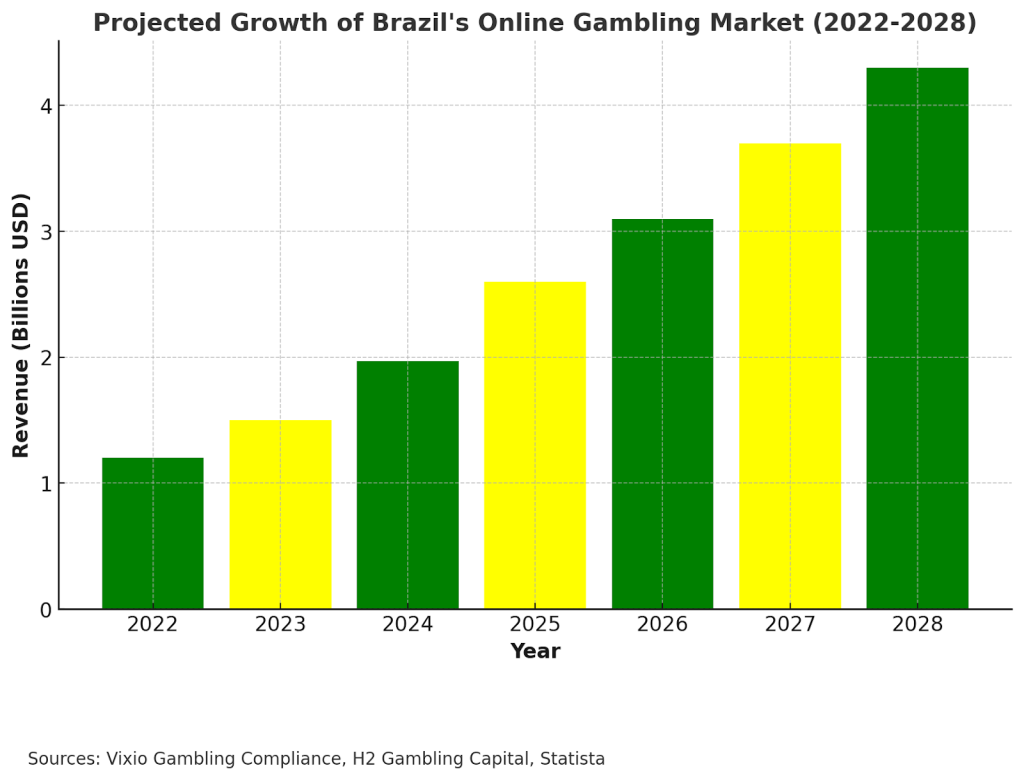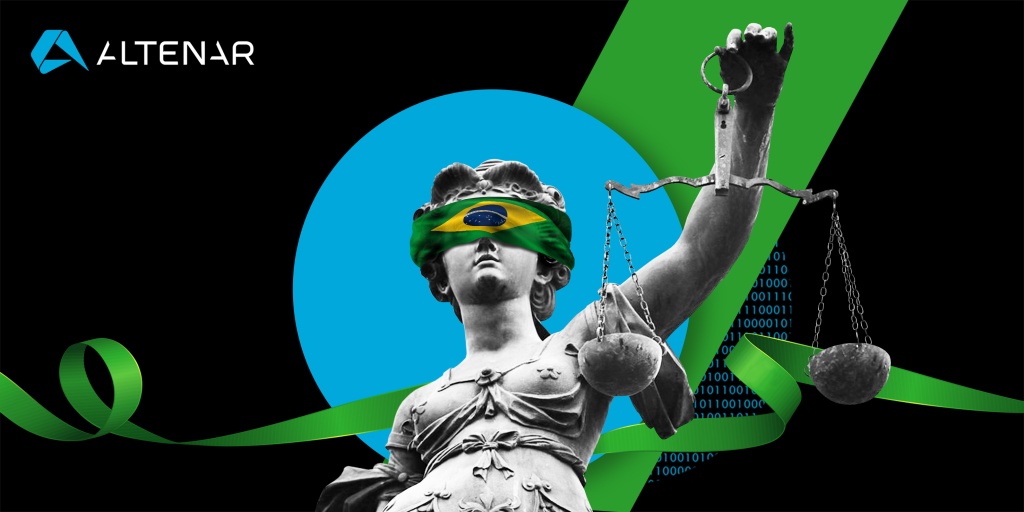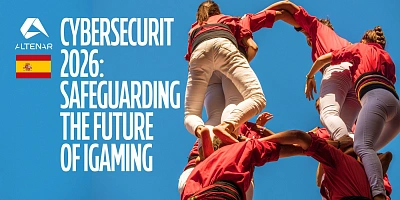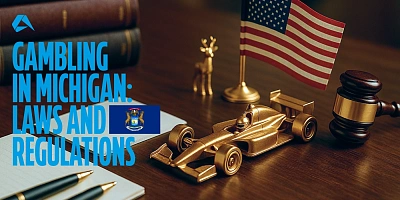New regulations introduced at the end of 2023 marked a momentous shift in Brazil’s approach to gambling, emerging from the shadow of an outright ban in 1946 to the establishment of a fully regulated market.
Online sports betting and casino games are now legal in one of the world’s largest economies. With around 215 million inhabitants profoundly interested in sports, this is a big deal for iGaming operators and service providers.
This article explores Brazil's gambling landscape to uncover the opportunities, identify the challenges, and provide valuable insights for investors eyeing this market in 2025.
History of Gambling in Brazil - Past and Present
Unlike many other jurisdictions worldwide, the legal situation for gambling in Brazil over the last decade has been unambiguous. Before 1941, gambling was considered an exciting form of entertainment, and the country enjoyed a lively casino culture.
The landscape shifted dramatically, however, with the introduction of The Criminal Contravention Act of 1941, prohibiting all games of chance. President Eurico Gaspar Dutra consolidated this policy in 1946, decreeing an outright ban on all forms of gambling. This move, attributed to prevailing moral and social concerns, resulted in the removal of casino permits, leading to the closure of the country’s gambling venues.
This situation remained for decades. Poker was the only legal game because it was, and still is, considered a game of skill rather than chance. Despite the ban, there remained an underlying appetite for gambling among the general populace. A move towards greater liberalisation began in 1971 with the legalisation of a state-owned lottery (Loteria Federal), followed by support for non-commercial bingo and horse racing in subsequent years.
The advent of online gambling in the mid-eighties continued the ongoing pressure on the government to legalise gambling. It was argued that the restrictions only applied to gambling operators within the country and did not stop licensed offshore operators from enjoying rising profits in a nation with a strong interest in sports.
Gambling in Brazil has been unregulated for the past eight decades. This situation changed in 2023 when the Chamber of Deputies approved a bill to regulate sports betting. Shortly after, on December 30 of that same year, Bill number 14.790, outlining the legal framework for gambling in Brazil, was passed into law.
While some land-based activities will remain prohibited in 2025, Brazil’s gambling market has fully transitioned into a regulated environment. Licences are now available for sports betting platforms and online casinos, opening the door to fixed-odds betting opportunities in the country.
The iGaming industry has evolved rapidly in recent years, and this is an exciting time for foreign and domestic gambling operators seeking to enter this new market. Understanding the prevailing changes to laws and regulations is essential for successful entry.
Historical Timeline of Events in Brazil’s Gambling Sector
Brazil's gambling history has been shaped by periods of prohibition, regulation, and reform. Below is a timeline of significant events that have influenced the country's gambling industry up to 2024.
Early Developments and Prohibition
1941: The Criminal Contravention Act bans all games of chance
1946: President Dutra enforces a nationwide gambling ban
1971: State-run lottery (Loteria Federal) is legalised
1993: Bingo is legalised and grows rapidly across Brazil
2004: Bingo is outlawed again due to corruption concerns
Gradual Legalisation and Expansion
2018: Law No. 13.756/2018 legalises fixed-odds sports betting
2021: Federal government begins drafting sports betting regulations
2022: Brazil elects new government, delaying full gambling regulation
Major Regulatory Reforms
2023: Law No. 14.790 establishes a legal framework for gambling.
2024: Fixed-odds betting and online casinos become fully regulated.
2024: Secretariat of Prizes and Bets is formed to oversee licensing
Our team of experts have detailed knowledge of the legal landscape in Brazil to ensure operators have the correct licences, certifications, procedures and strategies in place to meet all legal requirements.
Regulatory Bodies and Responsibilities
Caixa Econômica Federal regulated Brazil’s gambling market for many years during prohibition. In 2018, this responsibility was transferred to SEFEL (the Secretariat of Tax, Energy, and Lottery), which subsequently became SECAP (Secretariat of Evaluation, Planning, Energy, and Lottery).
With the new laws in place, Brazil's Ministry of Finance (Ministério da Fazenda) is set to play a leading role in clarifying certain aspects of the new law and navigating future regulatory changes. The Ministry of Finance oversees the country’s financial and economic policy, including those relating to the gambling industry.
Its primary responsibilities (as it relates to gambling) include the following:
-
Policy Development: Advising and implementing policies and strategies.
-
Regulatory Oversight: Ensuring operations are fair and transparent.
-
Taxation: Setting tax rates and tax collection on gambling activities.
-
Licensing: Reviewing applications and issuing licences.
-
Consumer Protection: Safeguarding consumers from unfair practices.
-
AML Compliance: Prevention of money laundering and terrorist financing.
-
Economic Impact: Assessing financial risks and benefits to the country.
Here are the key regulatory bodies governing Brazil’s gambling market in 2025. These bodies have been established to ensure the legal integrity of gambling operations in the country and influence the daily operations of licenced operators.
The Secretariat of Prizes and Bets (SPA)
Created under Law No. 14.790/2023, the Secretariat of Prizes and Bets (SPA) is Brazil’s central authority for gambling regulation. Officially launching in January 2025, it has been instrumental in shaping a structured and legally compliant fixed-odds betting market.
The SPA’s influence extends across daily operations, from licensing and tax oversight to enforcing anti-money laundering (AML) measures. Operators must adhere to strict technical and security standards, including the mandatory use of .bet.br domains. Beyond compliance, SPA wields significant enforcement powers, including blocking financial transactions, issuing fines and suspensions, and revoking licences for non-compliance.
GTI-Bets (Grupo de Trabajo Intersecretarial de Apuestas – Tax Compliance and Enforcement Unit)
GTI-Bets was established in January 2025 through Joint Ordinance No. 3/2025 as a specialised enforcement unit within the Secretariat of Prizes and Bets (SPA). Its primary role is to monitor tax compliance among licensed fixed-odds betting operators, ensuring they meet all financial obligations and contribute appropriately to state revenues.
With the authority to investigate tax discrepancies, flag irregularities, and recommend penalties for non-compliance, GTI-Bets plays a key role in maintaining transparency. By submitting bi-monthly reports to federal authorities, it actively shapes tax policies, reinforcing financial integrity across Brazil’s regulated gambling sector.
National Consumer Secretariat (SENACON)
The National Consumer Secretariat is part of the Ministry of Justice and plays a central role in safeguarding players’ rights in Brazil’s expanding gambling market. With online betting on the rise, SENACON ensures operators provide responsible gambling tools, protect vulnerable players, and maintain fair advertising standards.
Armed with investigative powers, SENACON can probe consumer complaints, penalise deceptive marketing, and impose fines on non-compliant operators. In 2025, its focus is sharper than ever, and licensed operators must offer self-exclusion options, betting limits, and support for problem gambling. By holding operators accountable, SENACON helps create a safer, more transparent, and ethically responsible gambling environment in Brazil.
State Regulatory Authorities (LOTERJ and Others)
Although Brazil now operates under a national regulatory framework, state governments still retain the power to issue local gambling licences for operators serving players within their respective territories. The State Lottery of Rio de Janeiro (LOTERJ) has been at the centre of legal disputes over state licensing authority, testing the balance between state and federal oversight.
A January 2025 Supreme Court ruling reinforced that state-licensed operators must restrict their services to players within their issuing state, limiting cross-border operations. Despite this, other states, such as Ceará, are developing their own licensing regimes, creating a patchwork of regulations that gambling operators must carefully navigate to remain compliant.
Compliance Requirements and Responsibilities for iGaming Operators
Obtaining a Brazilian iGaming licence can be challenging, and operators should expect to go through a process designed to ensure compliance with current legal and regulatory standards.
Background checks of owners and key personnel, together with business plans, financial projections, and operational details, are necessary for application submission. Applicants must also provide a range of financial statements and documents demonstrating proof of compliance with anti-money laundering (AML) and know-your-customer (KYC) protocols.
When a gambling licence application is received, the regulating authority evaluates the applicant's suitability under well-defined technical standards for fairness and security. If the application succeeds, the operator must pay a licensing fee of R$30m (£4.18m/€5.0m/$6.25m). The fee is valid for five years and allows the operator to promote up to three brands.
In addition, licensed operators are liable for an 18% gambling tax on revenues and monthly inspection fees that fluctuate depending on net income. Furthermore, Brazil established a Sin tax as part of a broader tax reform package that is yet to come into effect. However, the specific gambling rate has not been determined as of Feb 2025.
Discussions on its implementation are ongoing. As there is no cap on its potential rate, it has the potential to significantly impact operators.
Under the new regulations, operators that want to offer fixed-odds betting must have a subsidiary in Brazil with a local shareholder owning a minimum of 20% of the holding (under current law).
Maintaining a gambling licence in Brazil also requires adherence to several compliance and responsible gambling practices.
Operators must:
-
Advertise in a socially responsible way by protecting vulnerable groups from the dangers of excessive and irresponsible gambling.
-
Verify the bettor’s identity and check they are over 18.
-
Offer customers self-exclusion windows ranging from one day to six weeks, allowing bettors to limit playing time and losses.
-
Implement Know Your Customer (KYC), Anti-Money Laundering (AML), and anti-terrorist checks on customers.
-
Create a local customer service centre that provides 24/7 service in Portuguese via free electronic and telephone channels.
NOTE
This information is provided for informational purposes only and should not be considered legal advice. Regulations and licensing requirements for gambling operators in Brazil are still being developed and may change.
Key Considerations for Market Entry
Even though Brazil’s gambling laws are now fully in effect, several challenges still exist in 2025:
State-Level Restrictions: In January 2025, the Supreme Court ruled that gambling operators licensed by the state of Rio de Janeiro can only accept bets from players within the state. To comply, these operators must use geolocation technology to block out-of-state players.
Esports Betting Limitations: The Ministry of Sports introduced Ordinance 125, restricting esports betting to games officially recognised by the International Olympic Committee (IOC). This drastically reduces the variety of esports betting options available to operators.
Potential Tax Liabilities for Offshore Operators: Brazilian tax authorities are investigating whether former offshore operators should be responsible for unpaid taxes before the market became regulated. This has raised concerns about unexpected financial obligations.
Conflicting Licensing Systems: Some municipalities, such as Bodó, are issuing local gambling licences at much lower costs than federal licences. This has created tension between regional and national regulators over licensing authority and standards.
Banking Restrictions: Some financial institutions, including Nubank, are discouraging gambling transactions. This could make it more difficult for players to deposit and withdraw funds from betting platforms.
Regulatory Challenges, Pitfalls and Strategies for Success
Brazil’s gambling market is now fully regulated, but a common pitfall for gambling operators is underestimating the complexity of regulatory frameworks. Operators must overcome a demanding compliance framework to secure and maintain a licence, and underestimating the challenges can lead to delays or even rejection of licence applications.
The licencing process involves strict financial assessments, high technical standards, and adherence to anti-money laundering (AML) measures. The Secretariat of Prizes and Bets (SPA) mandates that all licensed operators transition their platforms to the .bet.br domain, while non-compliant businesses face financial transaction blocks or licence revocation. Furthermore, state-level licensing has introduced additional complexity, with regional regulatory frameworks sometimes conflicting with national requirements.
Taxation has emerged as another significant challenge, particularly with the introduction of GTI-Bets, a tax enforcement unit monitoring compliance among operators. On top of this, the potential for backdated tax liabilities on former offshore operators adds uncertainty, raising concerns about retrospective financial obligations. Meanwhile, Brazil’s sin tax remains an unfolding issue, though not yet in effect, as no cap has been set on how high the tax rate could be.
To succeed in Brazil, operators must stay ahead of evolving regulations, engage proactively with authorities, and implement solid compliance strategies. Partnering with local legal and financial experts can help businesses navigate changing rules and avoid penalties. Moreover, staying informed on new restrictions, such as esports betting limitations and advertising regulations, will be key to maintaining a competitive and compliant presence in this fast-evolving market.
Brazilian gambling laws are new and evolving, and what is law today may change tomorrow. Failure to stay updated can lead to non-compliance, risking penalties or licence revocation.
At Altenar, we understand these challenges intimately. Our iGaming software is designed with the flexibility to adapt to regulatory changes, providing a stable foundation for your compliance needs and success in Brazil.
Adopting a proactive, informed, and responsible approach allows your business to meet regulatory requirements and enjoy sustainable growth in this new and exciting market.
7 Top Tips for Success in 2025
1. Dedicate resources to compliance
A comprehensive understanding of the Brazilian regulatory framework is essential. To ensure operations align with Brazilian legal standards and requirements, we advise establishing a capable compliance team or partnering with local legal experts.
2. Engage proactively with regulatory bodies
Be proactive rather than reactive. Engaging with local and national authorities can provide insights into upcoming regulatory changes and opportunities, allowing your business to adapt swiftly.
3. Implement Secure Payment Processing Solutions
Brazilian financial institutions, including Nubank, have implemented restrictions on gambling-related transactions via Pix and other payment methods. Operators must develop reliable deposit and withdrawal alternatives that align with local financial regulations while ensuring efficient transactions for players.
4. Adopt .bet.br Domains Promptly
New regulations require all licensed operators to use ".bet.br" domains. A transition period allows ".com.br" domains to remain active for a limited time. Companies that fail to transition risk losing access to the market, as financial institutions block transactions to unauthorised websites.
5. Prepare for Selective Taxation on Gambling Services
Brazil's government has approved a sin tax on gambling but has yet to define the exact rate. With no cap on the tax, the potential financial impact on operators remains uncertain. Gambling businesses should monitor legislative updates closely and develop contingency plans to offset potential tax hikes through pricing strategies and operational efficiencies.
6. Invest in responsible gaming initiatives
Brazil, like other top gambling markets, takes social responsibility seriously. Integrating features on your platform that promote safe gambling practices from the start shows your company’s commitment to this practice and genuine concern for player welfare.
7. Cultivate strong local partnerships
Forging local alliances with businesses and community leaders can provide invaluable insights into Brazilian culture and consumer behaviour. It will help your company tailor services to resonate with Brazilian players. Furthermore, community involvement and investment will demonstrate a commitment to the local economy and bolster your company's reputation.
Opportunities and Future Outlook
Brazil’s gambling industry is stepping onto the global stage, with 2025 marking the beginning of an era that operators can’t afford to ignore. With Law 14.790/2023 setting the legal groundwork, the country is no longer just a sleeping giant in the betting world. It’s waking up fast. The nation now offers significant opportunities, especially for early investors who can overcome the prevailing volatility and uncertainty regarding the legal framework.
The market's potential is undeniable, and the numbers speak for themselves. With a population around 215 million, an unwavering passion for football and sports, and an online gambling market projected to hit over $4 billion by 2028 (15.39% annual growth rate until 2029), Brazil isn’t just another market. These numbers alone underline the size and scope of its vast potential and indicate a sector poised for expansion in 2025 and beyond.

January 2025 ushered in a fully regulated fixed-odds betting market, clearing years of uncertainty. The Secretariat of Prizes and Bets (SPA) issued 15 full licences and granted 52 provisional approvals, with many more waiting in the wings. This structured regulatory model has provided much-needed clarity, giving operators a real chance to establish dominance in a fast-moving industry.
The tax environment, however, will be challenging but will also bring rewards. A 12% tax on gross gaming revenue makes Brazil competitive, though up-and-coming legislative changes, like a proposed selective tax on gambling, must be watched closely.
Innovation will be the difference between success and stagnation in this market. With Pix dominating payments, mobile-first gaming, localised content, and savvy marketing will be essential. Meanwhile, regional licensing is evolving, with states like Ceará exploring their own frameworks, opening new pathways for expansion.
The bottom line? The time to enter Brazil is now. Those who establish a strong foothold today will reap the rewards for years to come.
Market Advantages and Disadvantages at a Glance
Market Advantages
-
Expansive Player Base: With a population rounding 215 million, Brazil offers one of the largest gambling markets globally.
-
Explosive Market Growth: Online gambling revenue is expected to surpass $4.3 billion by 2029, reflecting.
-
Favourable Player Engagement: Over 75% of Brazilian sports fans bet on sports, with football dominating betting activity.
-
Evolving Regulatory Stability: The newly structured market offers legal clarity and long-term security.
-
High Mobile Penetration: More than 84% of Brazilians have access to smartphones, supporting widespread mobile betting opportunities.
-
Untapped Potential: With only 15 full licences issued so far, new operators can still establish a strong foothold in the market.
Market Disadvantages
-
High Licensing Costs: A full gambling licence requires a BRL 30 million (Approx €5.0 / $5.25 million) fee, making entry expensive.
-
Regional Licensing Barriers: Supreme Court rulings now limit state-licensed operators to their respective states, restricting market reach.
Licence Application in Brazil (2025 UPDATE)
With the implementation of Brazil’s regulated online gambling framework, operators must obtain a licence from the Secretariat of Prizes and Bets (SPA) to offer betting services legally.
There are two primary types of licences available in Brazil:
-
Federal Licence: Grants operators the authority to provide fixed-odds betting and online gaming services nationwide and is valid for 5 years.
-
State-Issued Licences: Some states, such as Rio de Janeiro, issue local gaming licences that allow operators to provide betting services within state borders. However, these cannot be used for nationwide operations.
Applying for a Federal Gambling Licence
To obtain a national gambling licence, operators must apply via SIGAP (Sistema de Gestão de Apostas), the official platform managed by the SPA. All submissions should be in Brazilian Portuguese.
The application process involves:
Submission of Application: Operators must submit a comprehensive application to the SPA detailing their business structure, financial health, and compliance measures.
Technical Certification: Applicants must provide technical certificates for their betting systems, including the sportsbook or remote game server and integration processes.
Compliance Documentation: Operators must present documents demonstrating their adherence to anti-fraud and anti-money laundering protocols and responsible gambling initiatives.
Domain Requirements: Authorized operators must operate exclusively on websites with the ".bet.br" domain. A transitional period allows the use of ".com.br" domains; however, these sites must not offer betting services during this phase.
Financial Obligations: A licensing fee of 30 million reais is payable upon approval.
Are you looking for a fully compliant sportsbook solution for Brazil? Altenar’s platform is optimised for nationwide expansion under federal regulations. Request a demo today to unlock efficient operations with our advanced technology.
NOTE
This information is provided for informational purposes only and should not be considered legal advice. For detailed guidance on applying for a federal licence in Brazil, please visit the SPA’s official website or the official SIGAP portal managed by the SPA.













